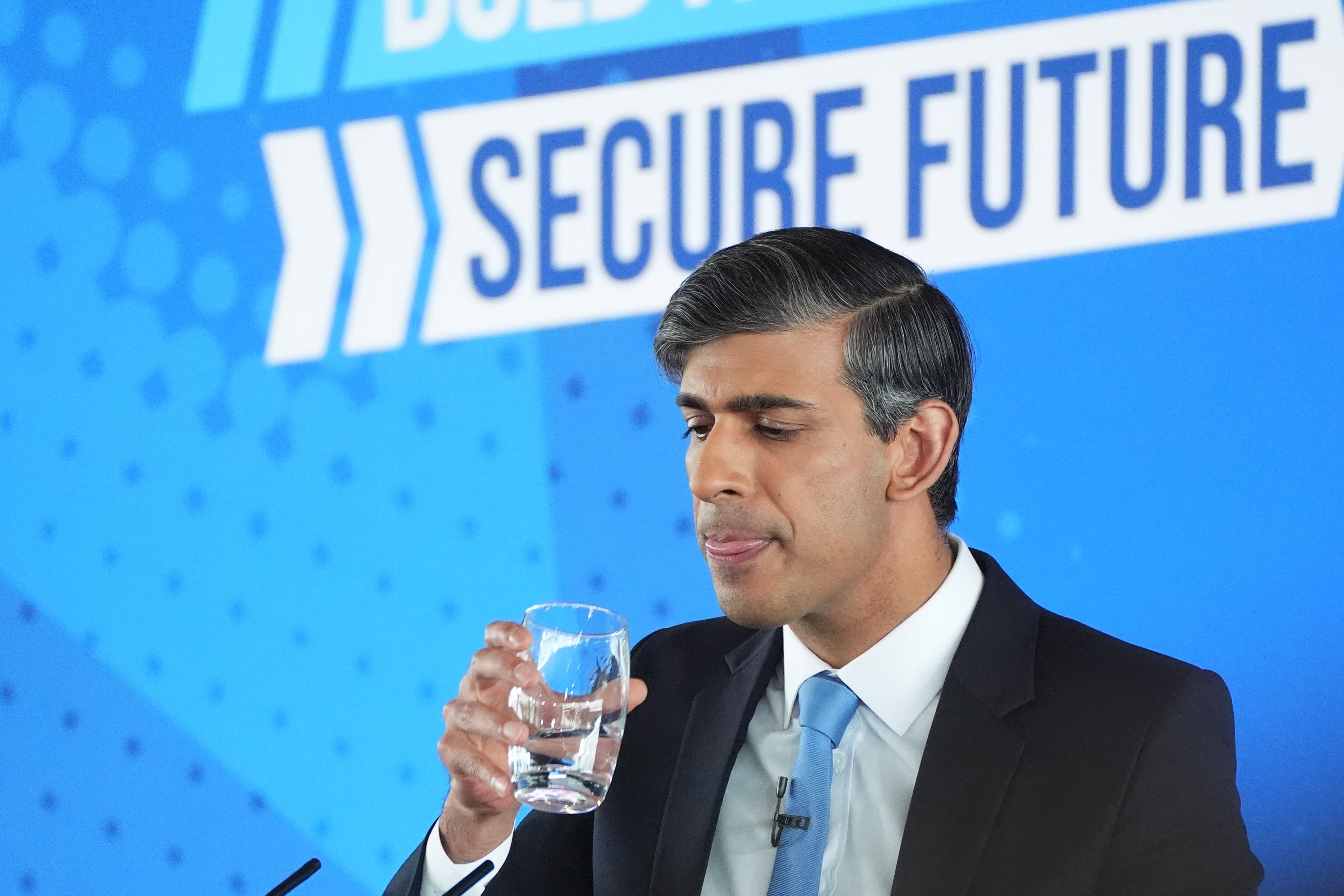Sunak has showered voters with promises he knows he will never deliver
With his kitchen sink manifesto, the prime minister has undermined his chosen line of attack – that Labour’s tax and spending plans do not add up. The Tories’ fundamental problem is that theirs don’t either, says Andrew Grice


The launch of the Conservative Party manifesto today – with the promise of tax cuts worth £17.2bn a year by the end of the next five-year parliament – represented Rishi Sunak’s last throw of the dice.
It was his final opportunity to turn around a campaign in which, despite having the advantage of knowing an election was coming when Labour didn’t, he has managed to go backwards.
The prime minister tried to transform the election into a battle over tax, offering another two percentage point cut in employees’ national insurance contributions (NICs) by 2027 and producing one “rabbit” not trailed in advance – the abolition of self-employed NICs within five years, to woo White Van Man.
Other goodies included cuts in stamp duty and a boost to the help-to-buy scheme aimed at the younger adults the Tories have so far neglected in this campaign.
But the manifesto did not go as far as some had hoped, including the party’s restive right-wingers and even a few of Sunak’s cabinet ministers. Their last-minute pleas for more red meat went unheeded, and there was no explicit pledge to leave the European Convention on Human Rights.
This grumbling wasn’t really justified because Sunak showered voters with promises like confetti. The blueprint also included campaign pledges to protect pensioners and some child benefit recipients from tax rises; 8,000 new neighbourhood policies officers; and 100 new GP surgeries.
In different times, the manifesto would have looked like a big, bold offer and might have rallied disaffected Tory supporters. It might have worked in 2019 against an even more implausible package offered by Jeremy Corbyn.
But times have changed. When Keir Starmer turned the tables today to accuse the Tories of producing a “Jeremy Corbyn-style manifesto”, it wasn’t an outlandish claim.
Sunak’s long shopping list undermined his chosen line of attack: that Labour’s tax and spending plans do not add up. The Tories’ fundamental problem is that theirs don’t either.
Of course, Sunak insisted his proposals were all “fully funded”. But the £12bn proposed savings from the welfare budget is doing a lot of heavy lifting.
The Institute for Fiscal Studies (IFS) says the target “looks difficult in the extreme”, and points out that some of it has already been allocated. The Tories can’t spend it twice. The manifesto says the Tories would raise £6bn from reducing tax avoidance but that is not bankable. Nor is the £20bn of savings Sunak promised by restoring public sector productivity to pre-pandemic levels.
I suspect Sunak’s need for a kitchen sink manifesto was one reason why he opted for a July election. It meant he could promise today’s tax cuts without the scrutiny from the Office for Budget Responsibility that the measures would have received if they had included them in an autumn statement in September, as Jeremy Hunt intended when an October or November election was on the cards.
Although he would never admit it, Sunak has taken a leaf out of Liz Truss’s book. To her cost, she sidelined the OBR before her ill-fated mini-Budget. Sunak’s manoeuvre might be less visible but it amounts to the same thing. He could not have risked a humiliating pre-election verdict from the OBR that the Tories’ post-election tax cuts were unfunded and would have had to trim his list of manifesto promises.
Labour will doubtless expand its estimate that the Tories have £71bn of unfunded pledges, while Sunak repeated the debunked claim that Labour’s £38bn of unfunded commitments mean a £2,000 tax rise for working households. Voters might well conclude they are all the same.
A scrappy draw on what Sunak has made the central election issue is good enough for Starmer when he is 20 points ahead – but not for Sunak.
The prime minister was “very confident” the choice between Tory tax cuts and Labour tax rises would become “crystal clear” by 4 July. But he unwittingly acknowledged why his tax gambit might not work: “I am not blind to the fact that people are frustrated with our party, and frustrated with me.”
That is why his proposed tax cuts will have less impact than they would have done at other times. Voters know the overall tax burden has risen to a 70-year high on the Tories’ watch, and there are more tax rises in the pipeline because the freeze in allowances and thresholds will remain until 2028.
The Tory optimists who can still put on a brave face insist we are only halfway through the six-week campaign, so there is still time to turn it around. But there isn’t. Privately, many Tory candidates fear voters have stopped listening. Those who conduct focus groups say Sunak’s disastrous decision to leave the D-Day commemoration early has crystallised politics where it is.
The goodies unwrapped by Sunak today will not enable him to break out of that. The Tory manifesto cannot be the game-changer Sunak desperately needed because the result is already set in stone.






Join our commenting forum
Join thought-provoking conversations, follow other Independent readers and see their replies
Comments